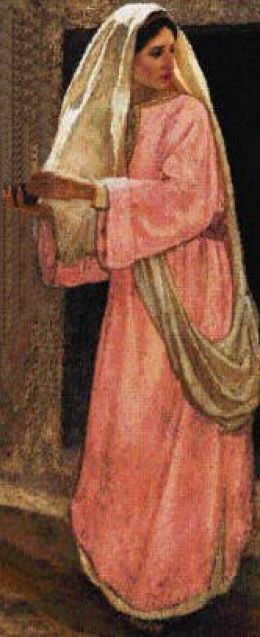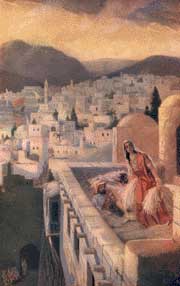There are stories of many courageous women in the Bible. We think of Ruth, Naomi, Miriam, Mary, and Esther to name a few. We admire the courage of Esther as she risked her life to approach King Ahasuerus and plead for her people.
But there is another woman in the Scriptures who risked her life by disobeying, even lying to her king. That woman was Rahab.
“This day I will begin to put the dread and fear of you upon the peoples everywhere under the heavens, who, when they hear the report of you, will tremble and be in anguish because of you.” — (God, speaking to the Israelites before they entered the Promised Land. Deuteronomy 2:25)
“For we have heard how the LORD dried up the water of the Red Sea for you when you came out of Egypt, and what you did to the two kings of the Amorites who were on the other side of the Jordan, Sihon and Og, whom you utterly destroyed. And as soon as we heard these things, our hearts melted; neither did there remain any more courage in anyone because of you, for the LORD your God, He is God in heaven above and on earth beneath”. (Rahab, speaking to the two spies. Joshua 2:10-11)
These words, “ for the LORD your God, He is God in heaven above and on earth beneath.” are nothing short of miraculous when we consider Rahab’s life, and how she was raised and educated, the culture she lived in, and what influences affected her.
 Rahab is one of those characters from the Old Testament, though while familiar to us, is a person that most of us don’t quite know what to do with, and so we may overlook her and little appreciate her. Also, most Christians can’t understand how God could use and so esteem a harlot and a liar. How can she be a heroine when she lived such a sinful life? What are we to do with this woman? How are we to understand her place in the history of God’s people? How are we to understand the fact that she is given a place of honor in the role of the faithful (Heb. 11:31), and the fact that her faith is commended to us (James 2:25), and the fact that she is even included in the lineage of God’s Son (Matt. 1:5)?
Rahab is one of those characters from the Old Testament, though while familiar to us, is a person that most of us don’t quite know what to do with, and so we may overlook her and little appreciate her. Also, most Christians can’t understand how God could use and so esteem a harlot and a liar. How can she be a heroine when she lived such a sinful life? What are we to do with this woman? How are we to understand her place in the history of God’s people? How are we to understand the fact that she is given a place of honor in the role of the faithful (Heb. 11:31), and the fact that her faith is commended to us (James 2:25), and the fact that she is even included in the lineage of God’s Son (Matt. 1:5)?
At the time of this story Rahab was a young woman living by herself in her own house. This in itself was unusual in her culture and indicated some measure of wealth and independence. She did have family who lived nearby, however. She had been a harlot, and her reputation had followed her, and she still wore that label. Her house was situated on the wall of the city and was probably near the main gate as that would be a help to her in her career as a harlot.
But something had changed in her life. She seems to have given up the life of a harlot and was now a manufacturer and dyer of linen. We know this is so by the fact that she had flax drying on her rooftop, and had a stock of crimson or scarlet line in her house. So we can see that she was now engaged in a new line of work as an industrious, intelligent, and probably well connected woman in the city.
She was also very well informed with regard to historical as well as current events. She knew all about the events of the Exodus, the crossing of the Red Sea, and the utter destruction of Og and Sihan, pagan kings who lived south and west of Canaan. She must have followed the relentless advance of the Israelites towards Canaan, and so she was not taken by surprise when the Israelite spies turned up on her doorstep. Something in this knowledge had prepared her for their arrival and how she would deal with them.
How these men ended up at her house is a matter of some speculation. Some commentators have said they had heard of her reputation as a harlot and so came to her house thinking that they would be inconspicuous there. Others have speculated that she was also an innkeeper, and so they came looking for a room in her house. But inns were not a part of this time and culture. Some have suggested that the change she underwent in her life caused her to go to the gate and watch for strangers to offer them a safe and hospitable place for the night, much like Lot had done in Sodom (Gen. 19:1). It seems that this latter reason may be what brought this woman and the spies together, plus a little providential help from God. He had prepared her heart to believe in Him.
Quickened by the Spirit, faith was planted within her soul, and so when the report reached her of God’s wondrous works, she received it “not as the word of men, but as it is in truth, the Word of God” (1 Thess. 2:13), and therefore she said, “I know that the Lord hath given you the land.”
She then demonstrated the reality of her faith at great personal risk through decisive action. She took the two spies and hid them defying the law of her king.

The Israelites had just entered the Promised Land with Joshua. He sent the spies to check things out, especially at Jericho. The king of Jericho heard that spies had entered the land and heard that they had gone to Rahab’s house. The king thought that Rahab would help him capture these spies. “Bring out the men who have come to you, who have entered your house,” he commanded. But, she had hidden them and actually had the courage to lie to the king, and she said, “Yes, the men came to me, but I did not know where they were from. . . .the men went out; I do not know where the men went. Pursue them quickly, for you will overtake them.” The king’s men went off on this false chase. The city gates were shut, and then Rahab went up on her roof, where she had hidden the spies, and made a deal with them. She had hidden them so that the Israelites would spare her family when they conquered Jericho. Notice that she says that the news about the Israelites had caused the other residents of Jericho to melt in fear (See Joshua, chapter 2).
Not so for Rahab. Instead of leading to fear and hatred for the spies when they arrived, her knowledge caused her to have faith in Jehovah as the one true God over all. She also understood that God had a plan and a purpose with regard to His people and this land, and she knew she could either melt in fear like her neighbors, or submit to Him and His plans and have faith in this God. Rahab chose the latter, and it is quite miraculous that she did so.
Consider that even the Israelites who “heard the voice of God speaking from the midst of the fire” and witnessed the “signs and wonders and by war and by a mighty hand and by an outstretched arm and by great terrors” (Deut. 4:33-36) had trouble placing their trust in Jehovah. They saw what the Lord God had done for them in Egypt and through their desert wanderings, and still refused to trust Him. They had visible proof in front of them, and yet many did not believe God.
This makes the faith of Rahab so miraculous. She was not a personal witness to God’s mighty wonders; she had only heard about them. Yet, she believed in God so strongly that she acted on it by hiding the two spies sent by Joshua into Jericho, and risking death by lying to the king.
It is the easiest thing in the world to believe when everyone else believes, but it is not so easy to stand against the crowd, to take a stand against your culture, even to defy your king, to be a solitary champion of God’s righteous cause when all around you are different. This was Rahab’s courage and faith. She had no one else who felt as she did, no one who could comfort or encourage her, no one who realized the value of her faith and her stand. She stood alone, yet she did not waiver.
She preferred to follow God’s will and word rather then follow the dictates of her culture. She was willing to risk her own safety for that of the spies. By faith she renounced all for God. She showed the courage of her convictions.
As a final encouragement, remember that Rahab’s faith became acceptable to God, and by it others were saved. Through her faith and courageous action her entire family escaped the death prescribed for the wicked living in Jericho. Her faith caused her to have concern for her loved ones, and to work for their salvation. Would that our faith cause us to have the same concern for our unsaved loved-ones, as well as any others that God brings across our paths needing the Gospel.

